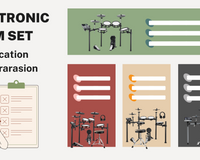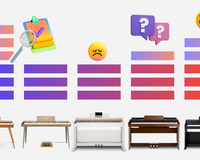Children Author: Why Music Education Is Important
Providing children with access to music has been proven to promote intelligence and creativity and ensure better social behavior. You can play music to children as early as in the womb, and in many kindergartens, early musical education begins at three.
In a time where the support of children has become so important, elementary music education is an essential cornerstone. What begins as a playful introduction to melody and rhythm can become a lasting hobby in later years, promoting social contact and stimulating creativity and imagination.
Music is the most social of all arts.
Even during music education in kindergarten, the youngest children learn that when you make music together, you can only do it with and not against each other. They understand - whether using musical instruments or singing - that you must pay attention to others to achieve satisfying results. Everyone bears responsibility for ensuring that a successful result emerges in the end. Music, therefore, also has a positive effect when it takes place together in the family. Cohesion is strengthened by the all-important approach to learning from one another. However, it is always crucial that making music together remains playful and fun and that the fun is not lost through unnecessary pressure to perform.
Holistic promotion through music - A benefit for every child
Early musical education opens a new world for the child: Rhythm, melody, movement, and language are inseparable here, complementing and responding to each other. The child is supported holistically, as all senses are addressed, trained, and refined. Music has a particularly effective effect on perception and a sense of rhythm. But language skills and logical thinking are also taught because melodies or staves are logically structured. A six-year long-term study from the 1990s with children between the ages of six and 12 found that music promotes children far more than previously assumed.
Music makes you happy.
Modern brain science demonstrates that music makes people happy. The limbic system, which is responsible for emotions, is activated when we listen to music. Which music we like depends on our family background and personal taste. The fact is that music triggers good feelings and changes our moods. Slow, sustained sounds calm us down, and fast rhythms also get our feelings going. It is also particularly noticeable that small children already recognize disharmonies.
Music against fear
Music stabilizes the psyche and makes children self-confident because they can observe their progress regularly. The child has control over it! - Be it an instrument or even its voice, which leads to more self-confidence. Especially when playing music in a group, there is an additional positive affirmation from the others; there is a trusting environment due to the common goal, and only little is determined by competitive thinking.
And what comes after early musical education?
When a child enters elementary school, they are ready to learn an instrument. If they have not found their favorite instrument in kindergarten, it is advisable to familiarize the child with several instruments.
You could be a keyboard player and would like to introduce your child to the Donner SE-1 Professional piano. It is portable and offers excellent sound quality with rich timbres. In addition, you receive free piano lessons through its app. If you want to teach your child, you can do that in the split mode. Children can be a little self-conscious as long as they are learning. Therefore, the Donner Piano comes with a headphone jack. You can download the user manual for additional support. 
Exposure to several musical instruments works best in an appropriate music school. At some point, when they have tried out different instruments, they will make up their minds and can then receive specific lessons. You must support your child because there will always be phases when he loses the desire to learn and practice. Encourage it to stick with it and consistently convey your appreciation of the child's progress. Because even if this is uninteresting for your child at first - with every practice, new connections are formed in the nerve cells of the brain’s plasticity, making your child more intelligent and creative.
If there are music education opportunities for your child, you should encourage them to take advantage of them - even if you are not that interested in music. Every child has musical potential, and encouraging it positively affects your child's abilities and skills.
About the author: Shakti is a seasoned children author in Australia. She is capable of writing in both English and German. With an expertise in early childrenhood education, Shakti believes in nurturing children’s talents with immersive stories, music, and plays experience.







































